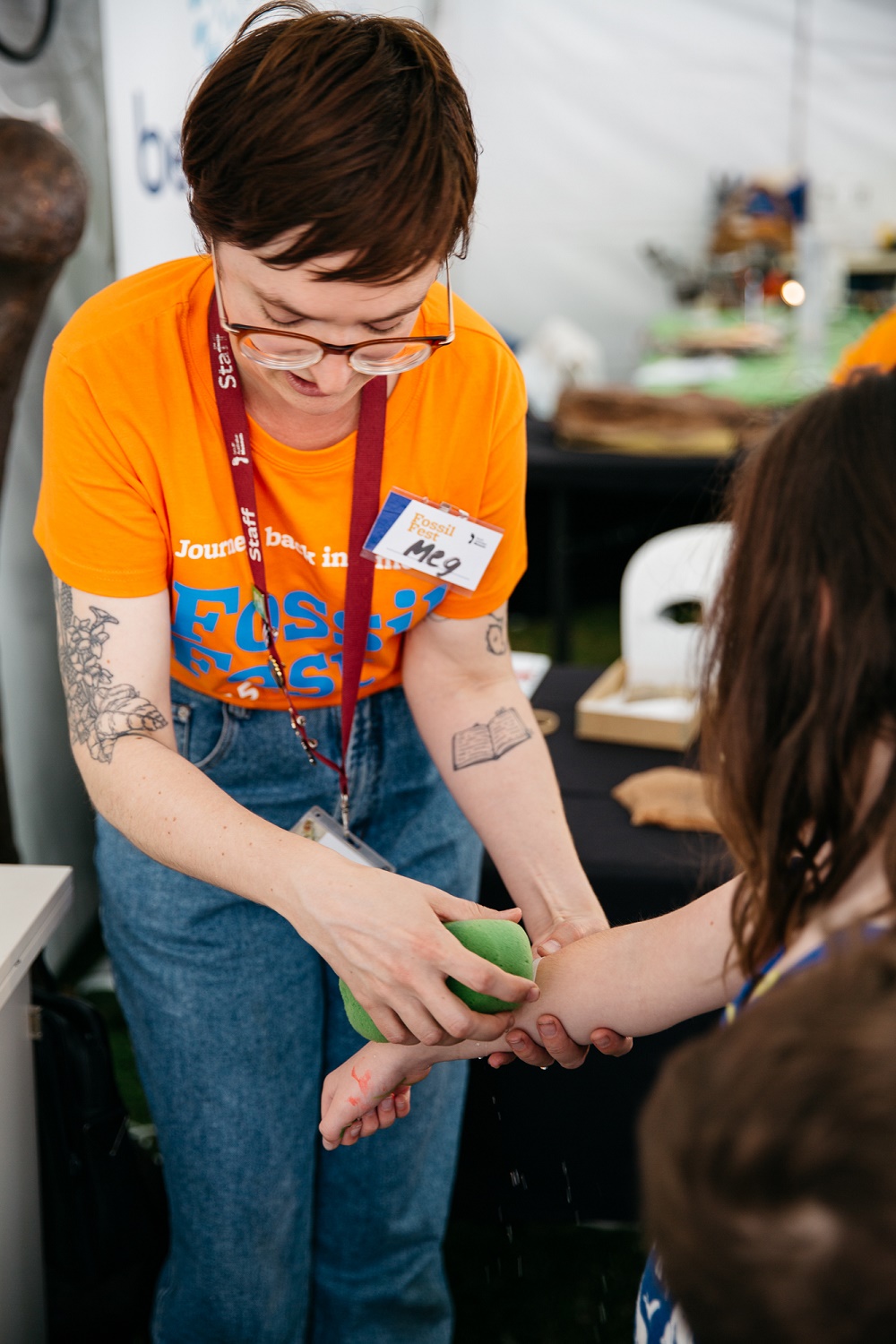The South Australian Museum’s first podcast series starts with a bang. Two bangs, actually, as Mammals Collection Manager David Stemmer takes us to a windy, drizzly beach at high tide, five minutes from the Victorian border. He and his team are bobbing in the swell around a Sperm Whale, when in the middle of performing the grisly task of carving up the dead giant, there’s a rumble.
“You can’t really quite put it into words,” Stemmer tells the listener. “The first time, it did a big bang and blood and guts spewed out about five metres high or higher. We were just running in all four directions as it was splattering on the ground behind us.
“When we finally got into the inside and found the stomach and we opened it up we found it full of giant squid beaks and lots of really cool, interesting stuff. It may sound gross, but we all got excited – like kids in the candy store.”
The North Terrace galleries that most visitors see are the tip of the museum iceberg, and Stemmer – who describes his domain as a “library of life” – is one of a vast unseen army of researchers and scientists out in the field or squirreled away in the multi-level Science Centre set back behind the main museum.
 Meg Lloyd
Meg Lloyd
“I feel like it’s reaching a different audience that we haven’t tapped into before – it’s science communication inspired by podcasts.”
Meg Lloyd
In previous years members of the public could gain a rare glimpse of these hidden workings during National Science Week, which in August became one of many events to go digital in 2020. “We would normally have an Open Day where people would come and look at the Science Centre, go on tours and meet the scientists,” explains Community Development Officer – and Collection Stories host – Meg Lloyd. “This year the change to digital was a great opportunity to do something I’ve always wanted to do – make a podcast.”
Many museums, galleries and cultural institutions around the world have tried to crack the nut of podcasting, from specially-commissioned series like MoMA’s A Piece of Work hosted by Broad City’s Abbi Jacobson and the UK National Trust’s Prejudice and Pride, to a wealth of recorded lectures, panel sessions and exhibition-adjacent material uploaded to podcast feeds for posterity.
If the South Australian Museum was going to dip its toe into the medium, Lloyd wanted to lean into its storytelling potential. “I feel like it’s reaching a different audience that we haven’t tapped into before – it’s science communication inspired by podcasts.”
With the support of a National Science Week grant – part of a $500,000 pool to help organisers around the country create digital programming in 2020 – Lloyd set out to shake the proverbial tree and record the stories that came out. Enlisting the help of artist and podcast maker Jake Holmes, the resulting hours of audio were shaped into four half-hour episodes each with their own arc and flow.
https://soundcloud.com/user-936016674/collection-stories-1-fishing-in-the-desert
“Between all the scientists there are so many things in common, everyone works together in this one great ecosystem that all the stories inter-link. David will tell a story about collecting whales, Dr Rachael King [Senior Research Scientist] will have a story about collecting invertebrates – they’re different stories but they contribute to the museum as a whole.”
While Collection Stories’ first episode focuses on the Museum’s eclectic Biological Sciences collection, its second looks to the Australian Aboriginal Cultures Collection. In taking in the museum’s vast holdings of significant cultural material – which includes ancestral remains – Lloyd and museum staff reflect on the ways that spirit of scientific enquiry and categorising the natural world takes on a far more sobering context for First Nations peoples.
Talking to two current Aboriginal people in the museum’s staff, collection manager Tara Collier and William and Margaret Geary Curator of Aboriginal and Torres Strait Islander Art and Material Culture Dr Jared Thomas, it considers how the work of the museum historically contributed to many racist structures that we still navigate today – and the enduring pain that these collections and their legacy bring (“[The Museum] has been proactive in the dehumanisation of Aboriginal people, and relegating us to a Stone Age past,” Thomas reflects of past practices). But it also explores the incremental shifts that are occurring to re-centre First Nations people in the preservation and sharing of their stories and culture.
“Their interviews are, I think, really powerful, and they both talk to how the past informs what we do today,” Lloyd says.
https://soundcloud.com/user-936016674/collection-stories-2-both-ancient-and-modern-the-humanities-collection
These complex, sensitive and incredibly important conversations are in step with those facing institutions around the world, but Lloyd also takes care to ensure the podcast is firmly rooted in this state, from the kind of stories and case studies she plucks from conversations with researchers, to interludes from senior Kaurna man Mickey Kumatpi O’Brien.
“I wanted it to be a very South Australian story, even though it’s reaching – I hope – a global audience,” Lloyd reflects. “Because as much as people tell Australian stories all the time, South Australia has really amazing stuff – and we don’t toot our own horn enough.”
New episodes Collection Stories are released on Fridays
Walter is a writer and editor living on Kaurna Country.
Get the latest from The Adelaide Review in your inbox
Get the latest from The Adelaide Review in your inbox